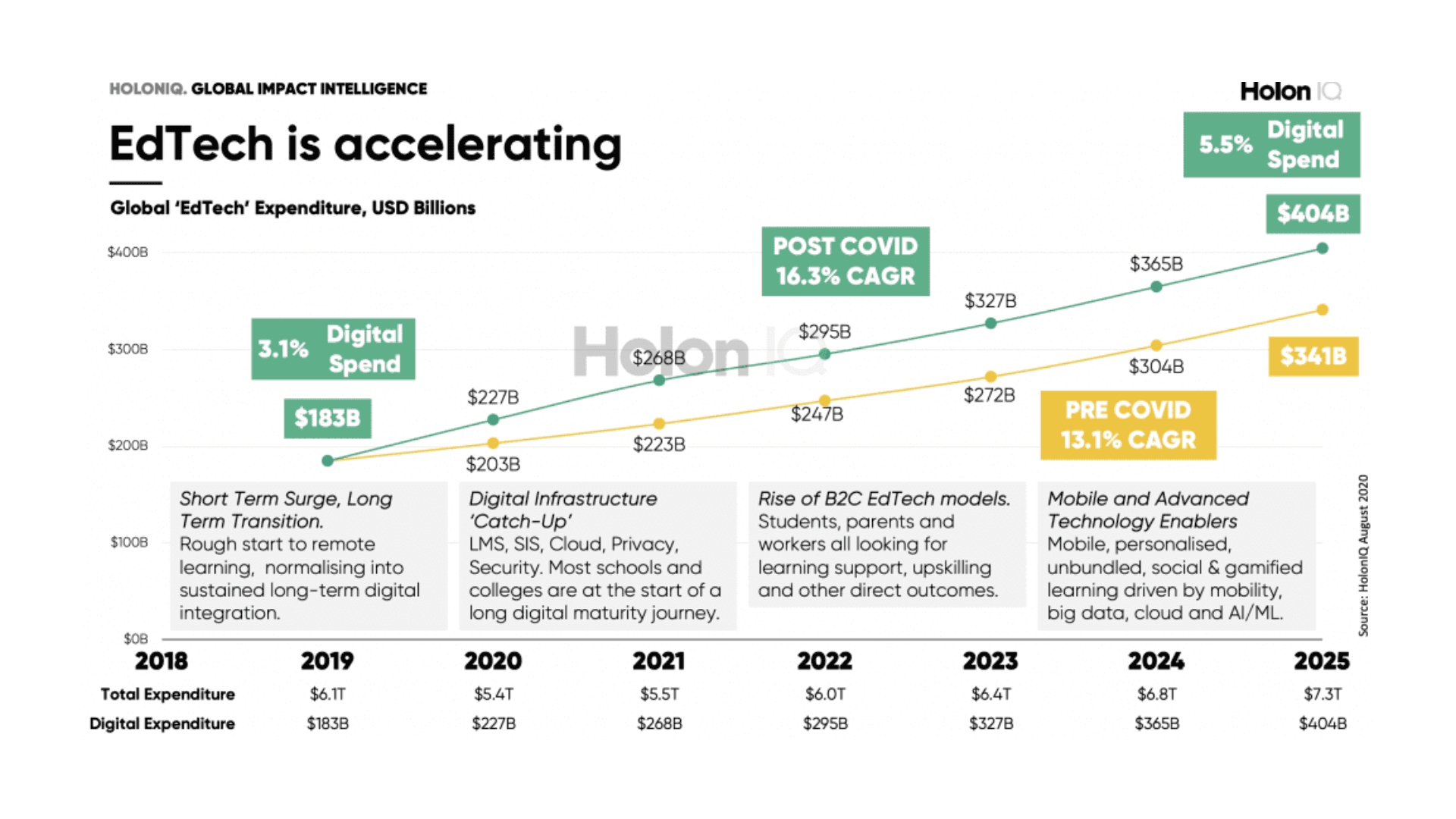What if your EdTech company could grow three times quicker in 2025? The global EdTech sector is projected to reach a value of $598.82 billion by 2032, experiencing a yearly growth rate of 17%. This indicates that there is significant potential for rapid growth. How can you capitalize on this rapid expansion?
A key driver is the implementation of AI advancements within EdTech companies, which can improve personalized learning experiences, streamline processes, and boost overall efficiency.

In this blog, we will examine effective techniques and the latest innovations that may enable EdTech firms to attain triple growth by 2025.
Market Size, Funding Trends, and Competitive Pressure in the EdTech AI Market

1. Rapid Market Expansion
The worldwide EdTech industry is anticipated to attain $598.82 billion by 2032, expanding at an impressive annual growth rate exceeding 17%. This expansion is propelled by the rising need for customized education, AI-augmented learning instruments, and the integration of digital platforms into educational institutions.
2. Increase in Investment in EdTech AI Startups
As the EdTech industry advances, investors are increasingly putting money into AI-powered solutions. In recent times, venture capital funding for EdTech companies has risen significantly, with billions of dollars invested in AI-focused firms. The increase in funding indicates that AI is not only a trend but a revolutionary influence in education (EdTech Magazine).
3. Escalating Competition
Artificial intelligence is propelling advancements in the EdTech field, resulting in intense rivalry between startups and long-standing educational organizations. Startups need to continually innovate and set themselves apart to thrive. This demand drives EdTech companies to create more effective, scalable solutions that exceed traditional approaches, especially as leading rivals improve their digital offerings.
4. The Necessity for a Robust EdTech AI Implementation Strategy
To stay competitive in this sector, EdTech companies need to develop a thorough strategy for implementing AI in educational technology. This method should focus on delivering customized educational experiences, improving operational effectiveness, and ensuring scalability. The successful deployment will enhance student results and facilitate long-term development for firms in an increasingly AI-driven market.
These developments indicate that adopting AI is not only a choice but a need for those seeking to expand and surpass conventional educational paradigms.
The Learning Revolution and Why AI Is Reshaping Education Forever?
Artificial intelligence is transforming education in unprecedented ways that were unimaginable a decade ago. It is no longer only a phrase; it is a fundamental element of student learning, instructor teaching, and the operation of educational institutions. AI is revolutionizing the education industry.
1. Personalised Training
- Custom Learning: It involves personalizing education to meet individual requirements and developing bespoke learning experiences. One of AI's most remarkable attributes is its capacity to provide personalized learning experiences. The era of uniform educational approaches has ended. Technologies powered by AI tailor lessons to address each student's unique requirements, allowing them to advance at their own speed while ensuring that everyone receives the essential assistance.
- Dynamic Adjustments: As learners interact with AI systems, the technology monitors their advancement and alters the curriculum in real-time. This guarantees that struggling students receive tailored assistance, while high achievers can progress to more advanced topics.
2. Automation
- Efficiency Improvement for Educators: Instructors and professors carry numerous duties, and AI can aid by automating repetitive tasks like grading papers, monitoring attendance, and managing timetables. This enables teachers to concentrate more on teaching and less on administrative tasks.
- Optimized Content Management: AI empowers educators to create and oversee educational resources with more efficacy. Artificial intelligence is enhancing educational content management by independently updating course materials and generating quizzes.
3. Real-Time Insights
- Immediate Feedback: It provides students and teachers with critical information, while prompt feedback eliminates the necessity for students to wait days for assessment results on tasks. AI-powered systems can deliver rapid evaluations and identify areas where students can enhance their skills.
- Predictive Analytics: AI can anticipate future results while evaluating current events. Artificial intelligence could help teachers detect students requiring additional assistance before problems arise.
4. Long-Term Implications for Education
- Transform Educational Content: Our view of teaching resources is changing. Artificial intelligence is enabling the development of more interactive and captivating resources, such as virtual reality classes and gamified materials. These technologies improve the pleasure and involvement in the learning process.
- Evolving Teacher-Student Engagement: While AI is not intended to supplant teachers, it is impacting how they interact with students. By managing repetitive tasks, AI frees up educators' time to concentrate on building meaningful connections with their students and providing tailored education.
- Enhancing Educational Effectiveness: More generally, artificial intelligence is promoting the more effective functioning of schools. It has the potential to automate every facet of student data management and optimization of school schedules, thus saving time and financial resources while improving the effectiveness of educational organizations.
Artificial intelligence transcends mere utility; it has grown into an essential element of the future of education. Collaborating with an EdTech AI development firm in the USA enables companies to maintain a competitive edge via the use of transformative technologies that are already reshaping education and will continue to do so in the future.
The EdTech AI Maturity Model and Where Your Platform Stands
It is essential for EdTech firms to figure out their position on the integration of AI into their platforms. This awareness is essential for identifying necessary modifications to facilitate growth and improvement. The AI maturity model offers a straightforward method to assess your platform's existing AI competencies and delineate a definitive trajectory for future improvements.
Here is a method to determine the position of your platform inside this framework:
- Starting with AI: If your platform remains in its nascent phases, AI may be used for rudimentary activities, such as automating administrative functions or evaluating student data. Although these are significant measures, the potential expands considerably as one explores AI more.
- Creating an AI-Enhanced Learning Platform: As the platform progresses, the focus shifts to designing personalized learning experiences. An AI-driven learning platform offers courses tailored to individual student advancement, promoting personalized educational experiences that address their unique needs.
- Leveraging Data for Educational Improvement: When your platform reaches an adequate level of sophistication, it ought to start using AI to deliver instantaneous insights regarding student achievement. These insights enable informed judgments on course enhancement, provision of individualized support, and identification of areas where students may want further assistance.
- Tailored AI Solutions for Education: The most advanced phase is the implementation of bespoke AI solutions for education that precisely cater to the distinct requirements of your platform. These solutions surpass conventional offerings, providing more flexibility and control over your educational resources.
Understanding your platform's current position enables you to strategize further actions for enhanced AI integration and ensures your platform remains at the forefront of innovation.
AI Strategies That Transform Student Outcomes & Revenue
Artificial intelligence has the potential to revolutionize EdTech firms, enhancing student outcomes and augmenting income. By using appropriate tactics, companies may enhance learning experiences, optimize operations, and generate new income streams. This is the method:
- Customized Educational Experiences: AI enables platforms to adapt classes to the distinct requirements of each learner. This maintains learner engagement and guarantees that no one lags behind. When students get the necessary assistance, their results improve, resulting in increased satisfaction and retention.
- Automating Administrative Tasks: AI can manage monotonous activities like as grading and attendance, allowing educators to concentrate more on instruction. This mitigates stress and enhances productivity, resulting in an improved experience for both educators and learners.
- Quick Alerts and Interventions: AI can identify pupils experiencing difficulties promptly, enabling platforms to take action before problems intensify. Modifying courses or offering additional assistance to tackle issues promptly yields improved outcomes and lowers dropout rates.
- On-Demand Tutoring: AI-driven intelligent tutoring solutions provide students with additional assistance outside classroom hours. This fosters a more adaptable learning environment, enabling students to progress at their own speed and get quick assistance as required.
- Practical Insights for Educators: AI provides educators with immediate feedback on student performance, emphasizing areas for improvement. This allows educators to swiftly modify their instructional approaches and materials, hence enhancing learning results.
- Revenue Expansion with AI-Enhanced Features: For EdTech firms, providing premium AI-driven services, such as tailored coaching or enriched material, is a profitable possibility. These offerings provide value for students while generating an additional income stream for the platform.
- Enhancing ROI for EdTech Firms with AI Implementation: The integration of AI may substantially increase the return on investment for EdTech firms. AI investments provide benefits by enhancing student retention and optimizing operations, resulting in more efficient and scalable platforms.
Integrating superior AI technology into online learning platforms boosts the educational experience and propels corporate development. Through effective techniques, AI is enabling EdTech firms to realize new opportunities for both learners and financial gain.
The EdTech Economics of AI Investment and Revenue Growth
In the EdTech sector, grasping how AI investment can directly impact your company's expansion is crucial. Although it may appear to be a significant commitment at first, AI presents considerable potential for increasing revenue and enhancing student success. When executed properly, these investments yield returns that can change your business significantly.
Here’s how AI impacts both your financial situation and academic achievement:
1. Enhancing Operational Efficiency: A primary capability of AI is automating repetitive tasks such as grading or monitoring attendance. This minimizes the time and resources allocated to these activities, enabling your team to concentrate on what truly matters, such as enhancing the learning experience.
2. Boosting Retention Rates: AI enables improved insight into which students require support at an early stage. Offering tailored assistance, whether via customized learning routes or additional materials, increases the likelihood that students remain active. Improved retention leads to steadier revenue over time.
3. Innovative Revenue Streams through Premium Features: AI allows you to develop premium features like tailored tutoring or unique learning experiences that can be marketed at elevated prices. These attributes provide students greater benefits, which contributes to boosting the total income for your platform.
4. Enhanced Understanding Results in Wiser Choices: AI produces useful information regarding student engagement with your platform. This information can be utilized to modify course material, improve teaching methods, and boost student involvement. By making wiser choices, you enhance student satisfaction while also increasing your profits.
5. Securing Funding and Collaborations: A robust AI strategy enhances the attractiveness of your platform to investors and prospective business partners. It demonstrates your dedication to innovation and growth, potentially leading to new opportunities and increased funding.
Investing in AI isn’t just about adopting a new technology; it’s about setting your EdTech business up for long-term growth and success. By making smart investments in AI now, you can create a more efficient, effective platform that drives both student success and financial growth.
EdTech-Specific Implementation Challenges & Solutions
Introducing AI in the EdTech sector presents numerous difficulties. Although the possible advantages of AI are clear, the path to effective integration can often be challenging. Nonetheless, with the appropriate method, these challenges can be surmounted, resulting in a more productive and beneficial educational experience for all participants.
Below are several challenges and approaches to address them:
- Concerns About Data Privacy: In education, safeguarding student data is essential due to its sensitive nature. Adhering to regulations such as GDPR and CCPA should be a primary focus. The answer? Establishing strong security protocols from the outset, such as encryption and transparent data management practices, to protect student information and foster trust among users.
- Compatibility with Current Systems: Numerous schools and organizations currently utilize systems that might not work well with the latest AI technologies. To address this, it's crucial to tackle integration step by step, beginning with features that are simplest to implement, and making sure they function effectively with the current infrastructure. Gradually, this enables a more seamless, easier transition.
- Engaging Teachers and Students: Involving teachers and students in new technology can be difficult, particularly if it seems like a complex extra feature. The crucial aspect is simplicity, developing AI tools that are user-friendly and provide obvious, concrete advantages. Providing practical training and continuous assistance facilitates the shift and guarantees that everyone is at ease with the new systems.
- Customizing AI for Educational Requirements: AI solutions frequently require adjustments to fulfill the particular demands of the educational sector. For instance, developing a custom chatbot for education can serve as a highly effective resource for addressing student inquiries and assisting them throughout their lessons. However, ensuring the chatbot comprehends the particular curriculum and educational goals is essential for it to be genuinely effective.
Why EdTech Companies Choose Custom AI Development Over Off-the-Shelf?
In the implementation of AI within their platforms, EdTech companies frequently encounter a decision between ready-made solutions and tailor-made AI systems. Although off-the-shelf tools may seem appealing because of their ease of use, they do not consistently address the unique requirements of an education-oriented platform. Here’s the reason numerous EdTech firms are favoring bespoke AI creation.
1. A More Suitable Match for Distinctive Requirements: Each EdTech organization has its specific objectives and obstacles. Ready-made AI tools are created to cater to a wide range of users, which may make them unsuitable for educational settings. Custom AI solutions are designed specifically to meet the unique requirements of a platform, delivering more focused and efficient outcomes.
2. Scalability with Platform Expansion: As EdTech firms expand, their technology must scale alongside them. Tailor-made AI can be developed to evolve with the platform, adjusting to a rising number of students and data while maintaining performance. Ready-made solutions frequently lack the adaptability to scale effectively as the platform grows.
3. Increased Control and Flexibility: Through tailored AI development, EdTech companies gain complete authority over the desired features and functionalities. You don't have to settle on what matters for the platform, whether it's enhancing student engagement, optimizing operations, or creating distinctive educational tools. Pre-made solutions typically provide reduced flexibility, binding businesses to a fixed set of features they might not require.
4. Safeguarding Data Privacy: Protecting privacy is a significant issue, particularly when managing confidential student information. Commercial AI solutions frequently incorporate external firms, which might not provide the security standards required by EdTech companies. By developing tailored AI, businesses can guarantee their data is securely handled and adheres to regulations such as GDPR or CCPA.
5. Ongoing Customization and Support: With custom-built AI, the relationship doesn’t end after deployment. Companies can continue to refine and adapt the system to meet evolving needs, ensuring the AI grows with the platform. Off-the-shelf tools, on the other hand, don’t always offer the same level of support or the ability to tweak features as the platform changes.
6. Gaining a Competitive Edge: In a crowded market, differentiation is key. Custom AI solutions allow EdTech companies to create unique experiences that stand out from the competition. Whether it's providing personalized learning experiences or offering tailored resources, custom AI helps platforms offer something special that’s hard to replicate with generic tools.
For EdTech companies aiming to build something unique, custom AI development offers a way to create tailored, scalable solutions that meet the exact needs of their platform. This personalized approach provides long-term benefits, both in terms of functionality and competitive advantage, setting the stage for success.
Shaping the Future of Learning with Smarter Digital Solutions
SoluteLabs helps education platforms become more intuitive and student-focused. Their solutions make learning smoother and more personalized, improving both engagement and outcomes.
By utilizing technologies like NLP, machine learning, and adaptive AI, SoluteLabs creates tools that lighten the load for teachers, automating tasks, improving content flow, and offering real-time feedback that matters.
Looking to build the future of education? Contact us to see how SoluteLabs can help.
